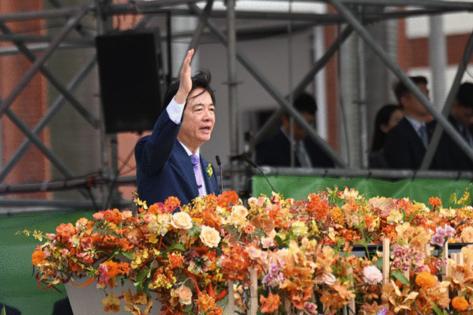Taiwan's president signals he'll stand up to China challenge
Published in News & Features
Taiwan President Lai Ching-te indicated in a speech that he would stand up to the challenges posed by China, comments that elicited a sharp response from Beijing.
While delivering his first National Day address on an overcast Thursday in Taipei, Lai said he’d work to “resist annexation or encroachment upon our sovereignty,” and added that China had no right to represent Taiwan.
He reiterated that that neither side of the strait separating the two sides was “subordinate to each other.” Lai used that line in his inaugural address in May, a speech Beijing criticized at the time for sending “a dangerous signal of seeking independence.”
Lai’s latest comments are a sign that Taipei’s relationship with Beijing will very likely continue to be fraught with tensions. They also mean that the Taiwan issue will remain a key point of contention between China and the U.S., which backs Taipei militarily, economically and politically.
China hit back at Lai later Thursday, with Foreign Ministry spokeswoman Mao Ning saying at a regular news briefing in Beijing that his speech showed “he is hell-bent on Taiwan independence and has the ill intention of heightening tensions in the Taiwan Strait for his political, selfish interest.”
She added that Lai’s government cannot “stop the historic trend that China will and must achieve reunification.”
Since Lai took office in May, Beijing has shown it deeply distrusts him because it worries he may formalize Taiwan’s independence, and it has taken an array of measures to show its displeasure with his government.
Just after his inauguration, China held major military drills around the main island, and last month it removed tariff exemptions on some farm products from Taiwan. Beijing has also stepped pressure on the offshore outposts that Taipei controls, and handed a nine-year prison sentence to a Taiwanese political activist convicted of “separatism.”
Beijing views Taiwan as part of its territory that must be brought under its control. It has said it prefers to do that peacefully but indicated that force will be used if necessary.
In his speech, Lai also said he was committed to “the status quo of peace and stability in the Taiwan Strait” — comments likely aimed at easing any U.S. concern the situation could spiral out of control on his watch.
A senior Biden administration official said that a disruption to peace and stability in the strait would have a significant effect on the global economy.
The official added that Beijing is increasingly using normal political events in Taiwan as pretext for military pressure, and that the U.S. would urge both sides to act with restraint.
He also said he hoped to work with China on a range of issues, including climate change and combating infectious diseases. Beijing is very unlikely to take him up on that offer. It cut high-level communication with his predecessor, Tsai Ing-wen, early in her tenure because she refused to acknowledge Taiwan was part of China, and those links largely remain severed.
Lai also pledged to rein in the property market, saying he’s “deeply aware that what everyone cares about the most is the pressure of high housing prices.”
The central bank in Taipei has raised the amount of funds banks must hold in reserve at its last two quarterly meetings while also unveiling targeted measures to try to address the problem.
Housing costs in Taiwan have risen for 23 straight quarters, the longest run on record.
(Colum Murphy contributed to this report.)
©2024 Bloomberg L.P. Visit bloomberg.com. Distributed by Tribune Content Agency, LLC.







Comments